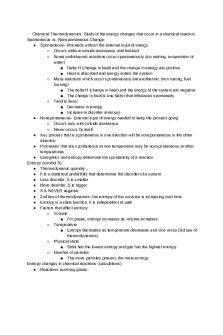Lecture on 10.05.16 PDF

| Title | Lecture on 10.05.16 |
|---|---|
| Course | Educational Psychology |
| Institution | California State University Fullerton |
| Pages | 2 |
| File Size | 39.4 KB |
| File Type | |
| Total Downloads | 30 |
| Total Views | 129 |
Summary
Susan Sy...
Description
I.
II.
How is intelligence defined A. People have their own opinion on what it means to have intelligence 1. Activity a) To help students think about what their scheme of intelligence is b) The person they identify as the smartest person they know, the traits this individual has will give an indication of how you judge someone if they’re intelligent or not c) Due to the scheme, what aspects of intelligent behavior do you not recognize? B. Two main approaches to defining intelligence 1. G factor approach a) Generalized across all domains (1) You have it or you don’t, generalized in all areas (2) Assumes there is one underlying intelligence factor that can be generalized across domains (3) “g” (or general intelligence) is an underlying factor that is used to when performing any cognitive task b) Related to IQ scores C. What IQ scores tell you about a person (1) Useful for identify kids on the the extremes (learning disabilities, or extra abilities) in order to accommodate (2) Allows you to compare a child to the same age peer (3) Is actually a comparison because it is relative to how well everyone else has done 2. Multiple intelligence approach a) Cannot be generalized (1) There are distinct areas where one might display intelligence however may not display in other areas D. Main disadvantage to group intelligence testing 1. Can’t assess anxiety 2. Students might not want to ask clarification questions due to amount of people noticing them 3. Might get distracted by the other students 4. No rapport a) No good relationship with another person (1) Standard 1 on 1 intelligence test will always be the best and ideal intelligence test 5. Standard one on one will give the most insight E. Main advantages 1. Convenience and cost effective Gardner’s Multiple intelligence Theory A. Believed that there were specific areas where people will and won’t excel in B. Assumes intelligence is domain-specific and cannot be generalized 1. Same idea that just because someone demonstrates intelligence in one
III. IV.
area, doesn't mean they’ll demonstrate it in another area 2. Specific careers will require a specific area of high intelligence a) This is how he applied his theory to make it more useful 3. See the multiple intelligences in your book C. No single IQ score represents intelligence D. Different areas call on unique cognitive skills E. Application: create lesson that integrate several different intelligences at once 1. It is not to integrate all the areas at the same time however, as each individual develops their intelligences differently What is the best way for teachers to use intelligence theories in the classroom What do educators need to know about accommodating children with special needs?...
Similar Free PDFs

Lecture notes on Boosting
- 11 Pages

Lecture ON Insurance LAW
- 8 Pages

Lecture on feminism - Notes
- 6 Pages

lecture on Charities
- 29 Pages

Lecture Notes on Elements
- 3 Pages

Lecture notes on Fraud
- 8 Pages

Lecture on 10.05.16
- 2 Pages

Lecture on overreaching
- 6 Pages

Lecture on Managerial Finance
- 27 Pages

Lecture Notes on The Descent
- 9 Pages

Notes on Lecture 8 - London
- 7 Pages
Popular Institutions
- Tinajero National High School - Annex
- Politeknik Caltex Riau
- Yokohama City University
- SGT University
- University of Al-Qadisiyah
- Divine Word College of Vigan
- Techniek College Rotterdam
- Universidade de Santiago
- Universiti Teknologi MARA Cawangan Johor Kampus Pasir Gudang
- Poltekkes Kemenkes Yogyakarta
- Baguio City National High School
- Colegio san marcos
- preparatoria uno
- Centro de Bachillerato Tecnológico Industrial y de Servicios No. 107
- Dalian Maritime University
- Quang Trung Secondary School
- Colegio Tecnológico en Informática
- Corporación Regional de Educación Superior
- Grupo CEDVA
- Dar Al Uloom University
- Centro de Estudios Preuniversitarios de la Universidad Nacional de Ingeniería
- 上智大学
- Aakash International School, Nuna Majara
- San Felipe Neri Catholic School
- Kang Chiao International School - New Taipei City
- Misamis Occidental National High School
- Institución Educativa Escuela Normal Juan Ladrilleros
- Kolehiyo ng Pantukan
- Batanes State College
- Instituto Continental
- Sekolah Menengah Kejuruan Kesehatan Kaltara (Tarakan)
- Colegio de La Inmaculada Concepcion - Cebu




